What I Know
This is how I want to live
This is what I know:
I am meant to live on the road.
This knowing has been gnawing at me since I abruptly ended my road trip from Alaska to Baja last year to pursue adoption. It’s been in my bones since I bought my 2004 Honda Element camper two years ago, then my 1999 Roadtrek camper van last year. It was a glimmer of a dream when I scrounged my 1991 Winnebago Warrior off the side of the road three years ago, set off cross-country, and barely made it to Ohio, taking a tour of every AutoZone along the way. (My husband Seth spent half that trip driving, and the other half on the side of the highway underneath the chassis.)
I’ve known in my heart that I need to get out of the small town where I put down roots sixteen years ago. I was a different person then; one who thought I would follow in my parents’ footsteps: buy a modest house, stay home to raise two children while my husband worked, and live there until I died. It was the life that had been modeled for me. It’s what I knew. I couldn’t imagine any other way to live.
That was before I’d stood on top of a hundred mountains in winter, braving 50-mile-an-hour winds and 25-below-zero temperatures. It was before I’d lived out of a backpack for 750 miles on the Appalachian Trail. It was before I’d driven solo 14,000 miles to Alaska and back with my dogs. It was before I’d become a writer with 850 subscribers on Substack.
It was before I sat here at this campsite in Acadia National Park in Maine for the sixth straight day, contemplating my future. Everything I need in the world is visible from the folding chair I’m sitting on: my 19-foot van with a king-sized bed, toilet, shower, kitchen, and fridge; a backpack containing my Kindle, iPad, and journal; a mountain bike; a bottle of water; and two dogs lounging at my feet in the sun. An added bonus is the stack of wood ready to drop in the fire pit.
The sunlight filters through evergreen boughs and warms my favorite pajamas—the ones decorated with retro-green campers and orange campfires. My dogs are flopped on their sides on the gravel, eyes closed, ribs rising and falling, covered in spruce needles and sap. Birds peep from high branches. People in distant campsites chop firewood. A beacon bobbing in the ocean a quarter-mile away rings like a church bell. When the wind blows just right, I smell a hint of salty sea.
All feels right with the world in a way it hasn’t for a very long time. I am content with sitting. I’m lingering long enough to be able to sit; to not be consumed by the fear that in resting, I am missing out. I contemplate riding my bike along the carriage roads or hiking through the mossy woods or walking along the rocky coast, but for the moment, it’s okay that I don’t.
The past six days have been a welcome opportunity to reconnect with my dogs. Baxter just emerged from eight weeks of bedrest following her knee surgery. Laney is between surgeries, having healed from two lumpectomies, and about to go in for electrochemotherapy for a recurrence of her sarcoma. Since I returned to New Hampshire last winter, Laney and I have been peak-bagging. She has now hiked 45 of the 48 White Mountain 4,000-footers, and is scheduled to finish the list two days before her next surgery. Since she’s an 11-year-old cancer patient, I don’t know how many more years of hiking she has left, and it was important to me that we accomplish this goal together before it’s too late. (Baxter finished the 4,000-footers several years ago.) With all these uncertainties, I’m especially grateful to wake up with both of them by my side, nosing their faces into my hand for pets, then rolling belly-up against my leg to lean their warm bodies against me.
Another uncertainty looms. I was supposed to take our two little foster kids on this camping trip, but a lapse in communication from their social workers left our plans up in the air until the last minute, and by then it was too late to make it work. (The kids are living three hours away with their current foster family while we transition toward a pre-adoptive placement, so for now they only visit us on weekends.) Seth and I realized it was for the best that they didn’t come; a six-hour drive and five days living in a van for the first time as a family of six (when you factor in the dogs) was probably too ambitious for an inaugural outing. We realized we should try something closer to home at first, just a night or two, and see how it goes.
Being back in the van—for two nights with Seth, and the rest of the week with just my dogs—has reminded me how hard it might be to live in such a small space with kids. Van life comes with its own set of challenges, like a limited supply of water, a limited capacity for sewer, and the need to dump and fill frequently. Everything takes longer in a small space: setting up the hallway shower, drying the floor afterwards, and stuffing the soggy curtain back in the closet. Cleaning pots and pans in a tiny sink with no elbow room. Rolling, scraping, and vacuuming dog hair daily. Digging everything out when you need it, and putting it back where you found it, because there is nowhere else for it to go. Stowing everything, closing all the windows and cabinets, and opening the shades every time you need to drive somewhere. The daily tasks of living are compacted and amplified in ways that are sometimes satisfying, sometimes frustrating, and always time-consuming. Toss in a 4-year-old boy and 18-month-old girl, and what would happen?
The other set of logistics to consider is what we’d do during the day. Two small kids aren’t going to be content to sit quietly in camp like I am. They will want to run, play, explore, and make noise. Some of those noises are toys that beep and ding and talk; then there is the incessant chatter and questioning of a young boy trying to make sense of the world (“What’s that? What’s this? What’s it do? Why?”); then there are the screaming tantrums of a toddler whose brain can’t cope when she doesn’t immediately get what she wants. Those things have been hard enough to deal with in the confines of our home. What happens when I bring that chaos to a quiet campground, or when we’re stuck in the van in the rain for days? The only way to know for sure is to try, which is what I’d hoped to do this week, but it will have to wait for another visit.
This is the life I want to live: on the road, in my van, seeing the world, being in nature. I had wondered if having children would make living in my small town tolerable, but an extended visit with our foster kids over April vacation proved that it would not. We walked the same three blocks day after day. We were tethered to the kitchen for three daily meals and about three hundred snacks. We played with plastic toys upstairs and downstairs and then upstairs again. Nap time in the middle of the day made it hard to go on an adventure, and the process of dinner, bath, and bedtime took hours. I sang the ABCs at least a thousand times to keep the baby from screaming. Seth and I collapsed into bed each night after the chores were done and barely said a word to each other before we passed out and did it all over again the next day.
I was miserable.
I felt like a grizzly in a zoo, pacing the perimeter of my confinement, sniffing the outside world, longing to snatch a salmon from the rapids of a river, but powerless to escape. By the end of five days, I was ready to rip apart anyone who entered my cage. The only glimmers of satisfaction I had (besides the snuggles and sweetness of the little ones) were the days we were outside, spending hours throwing rocks into a lake or stream, rambling through the woods, and picking up sticks. It was hard to make those moments happen, though, when they required packing up everyone and everything, loading the van, deciding where to go, driving there (and timing it with the afternoon nap), doing the thing, snacking before/during/after, loading back up, driving home in time for dinner, unloading, unpacking, cooking while the baby screamed, and getting ready for the next day.
The advantage of van life is carrying our home with us like a turtle: we extend our legs and explore the next place, then pull them in and hunker down. Everything we need is right there (especially the fridge). I daydream of eating hot oatmeal together in our camp chairs, then driving to a local park and playing on the playground. We’d make PB&J in the van, eat lunch at the picnic tables, and drive to our next destination during nap time. We would explore for an hour or two before dinner - take a walk on the beach and play in the sand, or paddle across an alpine lake. Then back to the van for some mac-n-cheese or ramen (because camp foods happen to be favorite kid foods!), maybe a campfire, then story time and bedtime. I’d go to bed early with the kids and then wake with them to do it again the next day. Along the way we’d study history, ecology, geology, astronomy, languages, and culture, immersing ourselves in the world.
That’s the dream. That’s how I see parenthood working for me. Seth understands; he has always been fine with letting me roam, and until we could find a way for him to join us full-time, he would drive or fly to visit us for a week or a weekend.
This is assuming I could handle parenting on my own, which I question. I determined after our last visit that having the kids living in our house would require full-time school and daycare, so that I’d have part of the day free to escape, exercise, write, and reset (or just sleep?). It was clear to me that I wouldn’t survive being a stay-at-home mom. Would it feel different if I were on the road doing the things I love every day with my kids? Or would I be ready to drop them at the nearest bus station with a Ziplock full of cheddar goldfish and a ticket home?
So I sit here with the conundrum of the either/or versus the both/and. I either choose parenthood or adventure, versus I can be an adventurous parent. Everything will either be amazing or terrible depending what I choose, versus everything will be amazing and terrible no matter what I choose. I will either regret my decision or feel blissfully fulfilled by it, versus I will have moments of bliss and moments of regret on whichever path I take.
I’ve turned my pile of wood into a crackling fire since I started writing. Gray flecks of ash fall on my keyboard. The dogs are fed, lying sphinx-like, ears perked to the popping flames. My neighbors at the next campsite just returned and reported on the day’s activities.
“This is all I managed to accomplish today,” I said to one of them, gesturing toward the fire. “And some writing.”
“No judgment!” he told me as he folded his camp chair and rolled up their outdoor rug.
They are a sweet couple from Denver, two guys probably in their 30s, taking a year off to travel around the country in their RV. I asked them about their next destination. They’re leaving tomorrow to travel through Vermont and upstate New York on their way to Glacier National Park, then across to the Pacific Northwest and down the west coast. It’s a lot like the trip I’d take if our foster placement doesn’t work out. I could leave as soon as next month, once Laney gets through her chemo. I’m tempted to go back to Alaska first before meandering down the west coast to Mexico, like I’d planned to do last year.
These guys have been great campsite neighbors all week, and I lamented their departure. “I hope my new neighbors will be as cool as you,” I said.
He replied, “I’ll just hope for you, no screaming kids. That’s my one criteria.”
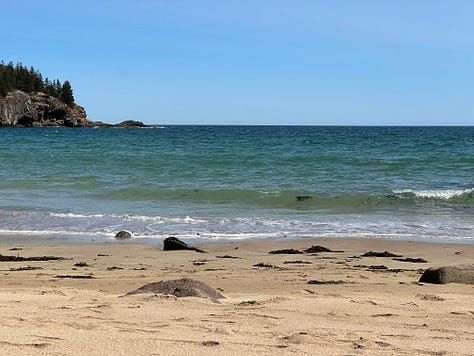
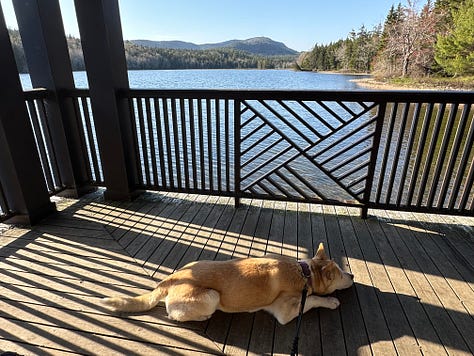

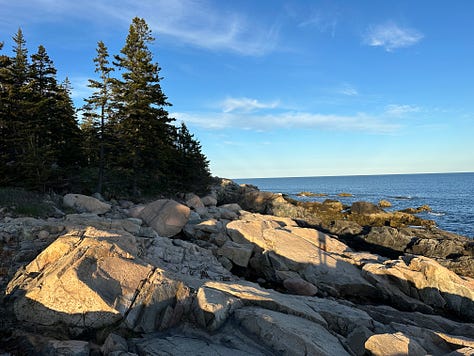




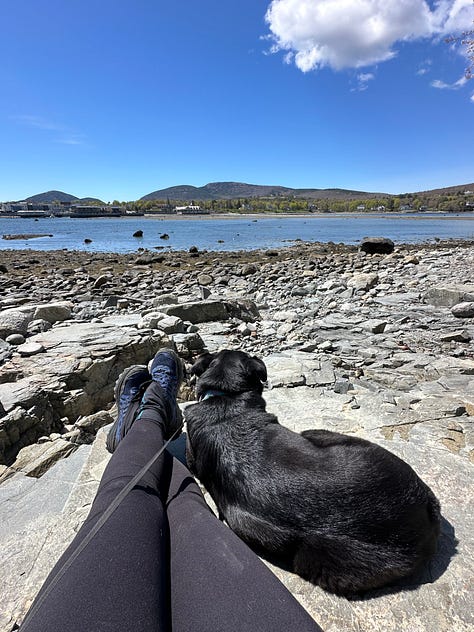
Upgrade to a Founding membership today, and I’ll send you a postcard from Acadia, or from my next adventure:


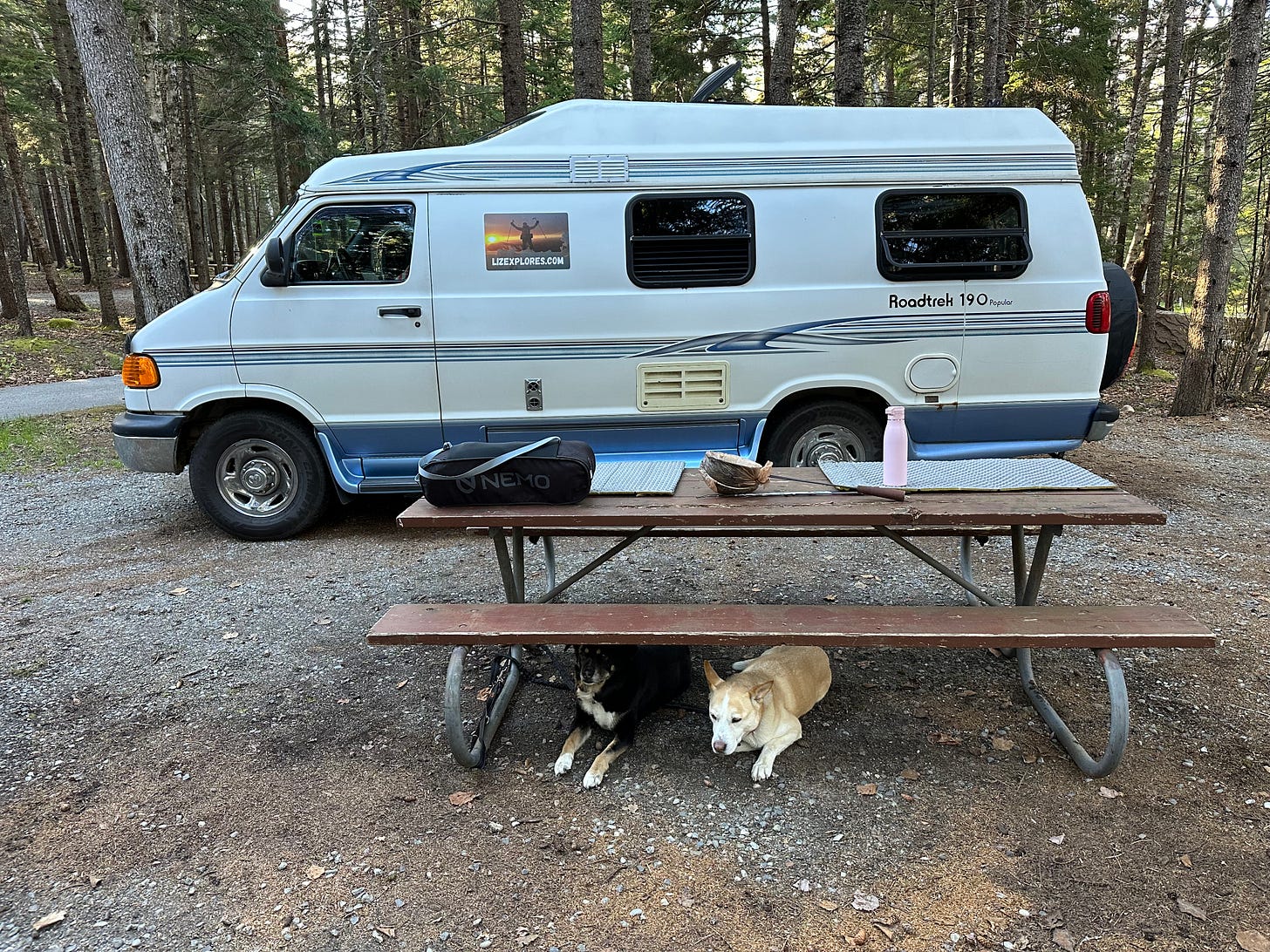
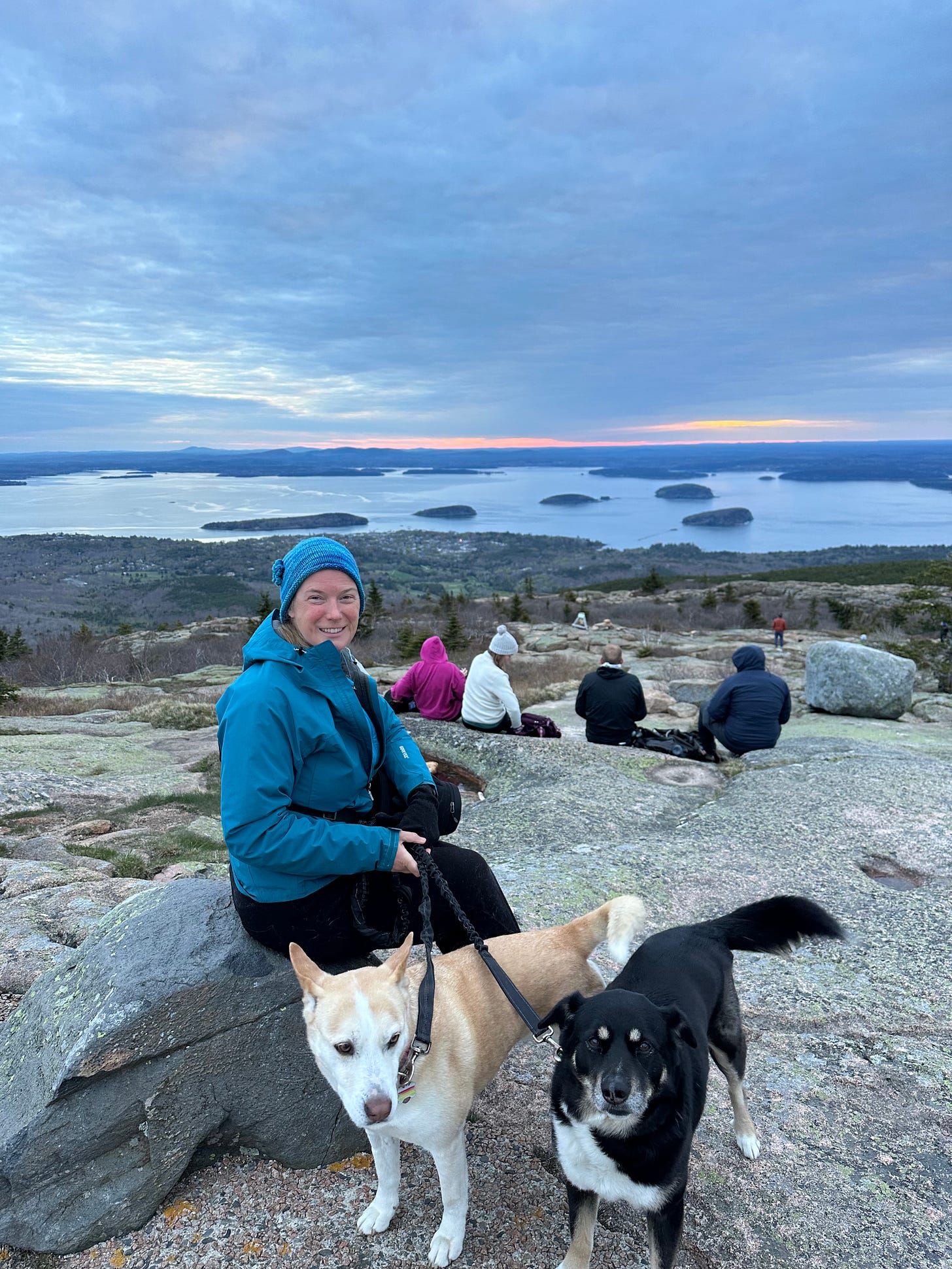



Reading through the lines it sounds like no kids is the smart choice. I say this with love and from experience.
'Everything will be amazing and terrible no matter what I choose'. This seems to nail it Liz. This is life, no matter which path we're on. Whichever path, we will run into ourselves, our challenges and our growth edges. What an exciting juncture you are at. Let life show you what is next ❤️